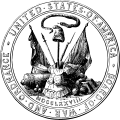IV Corps (Union Army)
| IV Corps | |
|---|---|
 IV Corps badge | |
| Active | March 13, 1862 – August 1, 1863 October 10, 1863 – August 1, 1865 |
| Type | Army Corps |
| Size | Corps |
| Part of | Army of the Potomac |
| Engagements | American Civil War |
| Insignia | |
| 1st Division | |
| 2nd Division | |
| 3rd Division | |
There were two corps of the Union Army called IV Corps during the American Civil War. They were separate units, one serving with the Army of the Potomac and the Department of Virginia in the Eastern Theater, 1862–1863, the other with the Army of the Cumberland in the Western Theater, 1863–1865.
IV Corps (Eastern Theater)[]
The IV Corps, Army of the Potomac, was created on March 13, 1862, and placed under the command of Erasmus D. Keyes, who had commanded a brigade at First Bull Run. It consisted initially of three divisions, under Darius N. Couch, Silas Casey, and William F. "Baldy" Smith. Couch's division was transferred to join VI Corps during the Antietam Campaign and remained with them for the duration of the war. The corps' peak strength (in early 1862) was 37,000 men.
The corps took part in George B. McClellan's Peninsula Campaign of 1862, playing a major role in repulsing Confederate attacks at Seven Pines and Malvern Hill. After the campaign, IV Corps remained on the Peninsula, with Couch's division later detached. The corps was attached to the Department of Virginia under John A. Dix, and took part (along with VII Corps) in minor diversionary actions against Richmond during the Gettysburg Campaign. The corps was officially discontinued on August 1, 1863.[1] Elements of IV Corps were later absorbed into XVIII Corps.
Command History[]
| Erasmus D. Keyes | March 13, 1862 – August 1862 | Army of the Potomac |
| Erasmus D. Keyes | August 1862 – August 1, 1863 | Department of Virginia |
IV Corps (Western Theater)[]
This corps was created on October 10, 1863, from the remnants of XX and XXI Corps, both of which had suffered heavy casualties at Chickamauga. It was initially commanded by Gordon Granger and its division commanders were Philip Sheridan, Charles Cruft, and Thomas J. Wood. It served with distinction in the famous unordered attack on Missionary Ridge at Chattanooga, and served in the Knoxville and Atlanta Campaigns. During John B. Hood's Franklin-Nashville Campaign, General William T. Sherman left the IV (and XXIII Corps), under the overall command of General George H. Thomas, to defend Tennessee, and the corps was heavily engaged in the battles at Spring Hill, Franklin, and Nashville. When the force Thomas commanded at Nashville was divided, he was left in command only of the IV Corps and cavalry under James H. Wilson and George Stoneman. The IV Corps was ordered to block the mountain passes and prevent a potential retreat by Lee's army into the mountains.
Records differ regarding the further history of the corps. Two sources[2] report that it was deactivated on August 1, 1865. A third[3] reports that after the war it was sent to Texas as part of the U.S. Army detachment dispatched to persuade French Emperor Napoleon III to withdraw his troops from Mexico, and was not disbanded until December 1865.
Command History[]
| Gordon Granger | October 10, 1863 – April 10, 1864 | Chattanooga and Knoxville |
| Oliver O. Howard | April 10, 1864 – July 27, 1864[2] | to Atlanta |
| David S. Stanley | July 27, 1864[2] – December 1, 1864 | wounded at Franklin |
| Thomas J. Wood | December 1, 1864 – January 31, 1865 | Nashville |
| David S. Stanley | January 31, 1865 – August 1, 1865 |
Notes[]
- ^ Eicher and Phisterer.
- ^ Fox. Stanley's personnel records indicate he commanded the Central District of Texas in June and July 1865, so a corps commander for the entire disputed period cannot be identified.
References[]
- Eicher, John H., & Eicher, David J., Civil War High Commands, Stanford University Press, 2001, ISBN 0-8047-3641-3.
- Fox, William F., Regimental Losses in the American Civil War, reprinted by Morningside Bookshop, Dayton, Ohio, 1993, ISBN 0-685-72194-9.
- Phisterer, Frederick, Statistical Record of the Armies of the United States, Castle Books, 1883, ISBN 0-7858-1585-6.
Citations[]
- ^ Official Records, Series 1, Volume 27, Part 3, p. 827
- ^ a b [1] O.R. Series 1, Volume 38, Part 5, Special Field Order # 44, P 266
- Union Army corps
- Military units and formations established in 1862
- 1862 establishments in the United States
- Military units and formations disestablished in 1865
